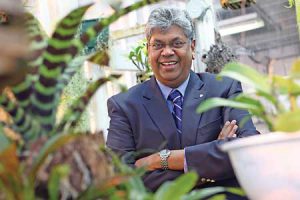
By Allyson Rowley
Is our food safe to eat? McGill’s new Food Safety and Quality Program (FSQP) is an interdisciplinary research initiative, which joins the Faculty of Agricultural and Environmental Sciences (FAES) with the Faculty of Law and the Desautels Faculty of Management. The FSQP will undertake research, offer undergraduate and graduate programs, and provide independent, third-party expertise to the Canadian food industry to address the burning questions around safety of the food system. FAES Dean Chandra A. Madramootoo, who was the driving force behind the FSQP, together with senior food industry executives and an alumni advisory committee, sat down to talk about the initiative.
What’s the difference between “food safety” and “food security”?
“Food security” refers to the big global problems we are seeing right now: food shortages in some countries, rising food prices, access to food and so on. We’re talking about chronically undernourished countries that are deprived of land, economic resources and clean water, for example much of central Africa, Asia and Haiti. Of course, we have our own inner cities and our own Native populations who have significant food security issues. That’s why the FAES created the annual Conference on Global Food Security and we founded the McGill Institute for Global Food Security.
When we say “food safety,” we are addressing problems such as contamination in the production, processing and distribution of food, food-borne diseases, pathogens, viruses, and the like. A lot of the food we eat is imported. It has travelled a huge distance in containers, sat on docks, and there are numerous potential sources of contamination along the way, from production to consumption.
Is food safety an issue that we still need to worry about, even in Canada?
That’s a question consumers are asking more and more, as we see a more sophisticated and demanding population. We want to be reassured that what we eat is safe, clean and not contaminated – and rightfully so. The reality is that problems of food safety have been with us for decades. No one can foretell when the next outbreak will be, and food comes from so many sources. As well, over the next 25 to 50 years, it’s expected that the world food supply must double to keep up with global population growth. So, there will be a need for even greater vigilance.
What’s the special ingredient that McGill and the FAES can offer?
McGill is one of the few Canadian universities that can offer such a broad range of expertise. We have a Faculty of Agricultural and Environmental Sciences here at our Macdonald Campus, and through collaborations with the Faculties of Law, Management, Medicine and Science, we can offer expertise in every part of the process – from the time the seed goes in the ground to when the food reaches the consumer. The Faculty of Law can assist with regulatory and policy issues of food safety, Science can provide expertise on contamination detection, and so on. We have a unique combination of strengths here at McGill.
What progress has been made in the food industry, addressing food safety of their own accord?
Our industry partners have played a pivotal role in the creation of FSQP, and they will be full partners in this collaborative research, teaching and outreach program. They know they can’t keep up on their own with the science, the detection technology, the worldwide laws and all the rest. They know they will need access to McGill’s expertise to train their next generation of employees, the next group of MSc’s and PhD’s to address the many challenges. They are fully aware and fully on board.
